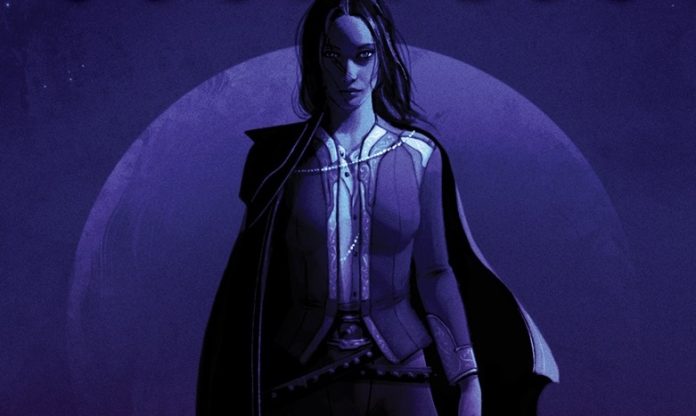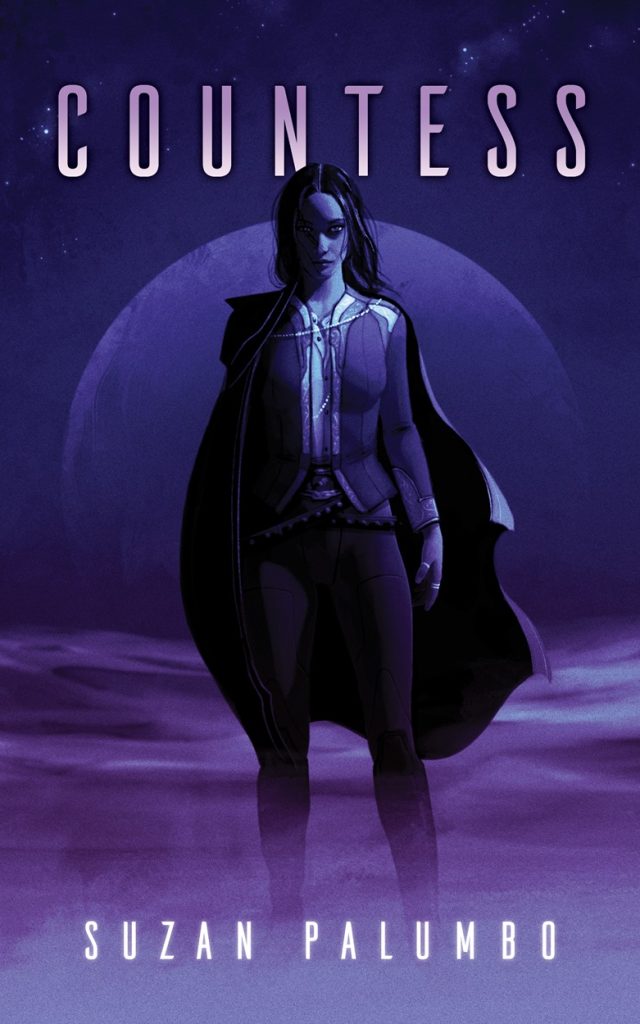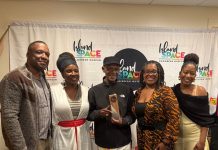
Suzan Palumbo is a Nebula, World Fantasy, Aurora, and Locus Award-nominated speculative fiction writer and editor. Originally from Trinidad and Tobago, she grew up in the west end of Toronto, Canada. Her debut short story collection, Skin Thief: Stories, was published in 2023 by Neon Hemlock Press, and her debut novella, Countess, is out now from ECW Press.
A queer, Caribbean, anti-colonial sci-fi novella, Countess follows Virika Sameroo, a first lieutenant in the Æerbot Empire’s merchant marine, who is wrongfully imprisoned for her captain’s murder. Betrayed by the empire she served, Virika embarks on a mission of revenge to dismantle the oppressive regime that has subjugated her people for generations, with their fate hanging in the balance.
We spoke to the author and got the scoop on her background in the fantasy world, social and political themes, and all things Countess.

How did you get into writing?
I’ve been a lifelong lover of stories and reading. I was an ESL teacher for many years before I decided to become a writer. I started submitting stories for publication in 2015 and have been writing stories ever since.
I am a speculative fiction writer, writing primarily in the horror, dark fantasy, and science fiction genres. My short stories and other works often explore issues surrounding transformation, identity, race, immigration, sexual orientation, and gender through a gothic lens. Trinidadian folklore and culture play a large role in a lot of my work, along with hauntings and the natural world.
Can you tell us a little bit about your new book, Countess?
Countess is partially inspired by my love of The Count of Monte Cristo, a book that captured my imagination at a young age. It takes the premise of the classic by Dumas and diverges from it to reflect the journey of a queer Caribbean woman and her experiences. It is also inspired by my own personal history and the history of the Caribbean region. Themes of injustice, oppression, personal versus collective revenge, revolution, and liberation are integral to the novella. It is a deeply anticolonial story.
The book and the protagonist are very close to my heart. A lot of my experiences as an immigrant and member of the Caribbean diaspora went into crafting Virika Sameroo. I had never seen an Indo-Caribbean character portrayed in a long-form speculative work before, and I wanted to write a book that would provide that representation for readers who needed it. On a fun note, I wanted to see Trinidadian food in space. I love my food, and I wanted to see people eating roti and curry in the future!
What drew you to explore the sci-fi genre for this novella?
A lot of my work before Countess would be considered horror and dark fantasy. Those works focused largely on interpersonal conflicts and used supernatural elements to explore them. While Countess does delve into personal conflict, the novella also takes on much broader themes related to structural injustice. For example, I was interested in portraying labor solidarity in the future. I also wanted to write a book that had some semblance of the world we live in now. Science fiction was better suited to those goals.
I approach writing science fiction as a method of critiquing current sociopolitical concerns. Yes, Countess contains fun adventure, spaceships, swashbuckling, and romance, but built into all of those aspects of the book are concerns that Caribbean immigrants face today in Canada. Issues of racism, poverty, and discrimination are not ones that disappear simply because “it’s the future.” If we build future societies with the same colonial attitudes that we have now, the same injustices will persist. The only difference will be that instead of facing prejudice at your office job, you will encounter it on your space flight.
With that in mind, I created an interplanetary empire that had a resource-based economy and interwove all of the concerns I’ve witnessed people I love and my community grapple with.
Talk about how you approached blending Caribbean history with fiction
The parallels between the potential colonization of outer space and the brutal colonial projects set up by the British and other European empires in the Caribbean region are undeniable, in my opinion. Even the language used to discuss future space colonization mimics that used by colonists of the past—settlements, colonies, resource extraction, and the idea that space exploration is our “destiny” all echo sentiments used to rationalize and justify the appropriation of land and wealth.
Currently, private companies are developing commercial space flights and trips. This recalls the commercial interests that fueled colonial expansion in the past. The rush to send probes and rovers to planets in our solar system by governments mimics the search to be the first to “discover” and claim new trade routes, resources, and territories.
As a result, I feel the Caribbean, like many regions that have been colonized, and its history are very relevant when considering the implications of what could happen if humanity leaves Earth in search of new planets to inhabit. I think it’s completely plausible, with capitalism as the driving force behind these “ambitions,” that we will see similar injustices play out to serve exploitative projects in space.
Virika Sameroo, the protagonist of Countess, is a descendant of Trinidadians who indentured themselves to escape climate catastrophe in the Caribbean. Her journey parallels that of her ancestors, who were enslaved and indentured and brought to the Caribbean by the British Empire to work plantations for the empire’s material benefit. Virika and her allies’ push for freedom from the Æerbot Empire is analogous to, and references, the historical struggle for independence among all of the Caribbean nations. Countess is steeped in Caribbean history because I sincerely believe Caribbean history should be at the forefront of any discussion of future space colonization.
How do your cultural roots influence the world-building and characters in your work?
I was born in Trinidad, and I grew up in a very vibrant Caribbean immigrant neighborhood in the west end of Toronto. My parents immersed me in Trinidadian culture. I grew up eating Trinidadian food and listening to Soca, Calypso, Reggae, and Chutney music. My mother told me stories about jumbies, douens, soucouyants, la diablesse, and all of our folklore. My family never stopped speaking dialect when they arrived. We maintained close ties with our family in Trinidad and still do to this day.
I’ve often been told that my way of speaking and approaching the world feels Trinidadian. I can’t describe exactly what that means, but it feels like a correct assessment. My roots are not buried. I live Trinidadian culture every day. It is a part of my life, and it is present as I navigate living in Canada and being a naturalized Canadian citizen. It is part of the fabric of who I am, so it’s more than an influence—it’s inseparable from everything I do and create.

How did you develop Virika’s character arc, and what message do you hope readers take away from her quest for justice?
Spoiler ahead
Edmund Dantès’ character arc in The Count of Monte Cristo served as my starting point for Virika. They both suffer injustice and have their lives destroyed by political scheming, corruption, and jealousies. But while Edmund plots cunning, personal revenge against the people who have harmed him, Virika, who is a queer immigrant woman of color, realizes that the injustices inflicted upon her are both personal and structural.
What’s happened to her could happen to anyone like her. In fact, she witnesses it happening to others. When Virika manages to free herself, she wants to exact revenge on those who have ruined her life, but she also recognizes that her community will always be vulnerable to this type of violence. She wants to protect and help the Antilleans.
This is something I watched people like my mother and other Caribbean women do while I was growing up. They’d take care of those who needed help because that’s how they ensured their community thrived. They also spread joy everywhere they went! Virika’s ultimate enemy is the empire, and her revenge is aimed at destroying it so that it will not hurt her people ever again.
The message I hope readers take away from Countess is that ensuring justice and equality for all is a worthy goal, even when all hope seems lost. Also, that human dignity and the inherent value of life are not negotiable.
What’s next on the horizon?
I am currently at work on a full-length Trinidadian-Canadian Edwardian Gothic novel, which I hope to have completed by the end of the year. This book is going to tie together one of Trinidad’s major creation myths and incorporate a queer love story and a lake monster! I’m back to my full-blown gothic horror origins with this one, and I’m excited to get it finished!






























